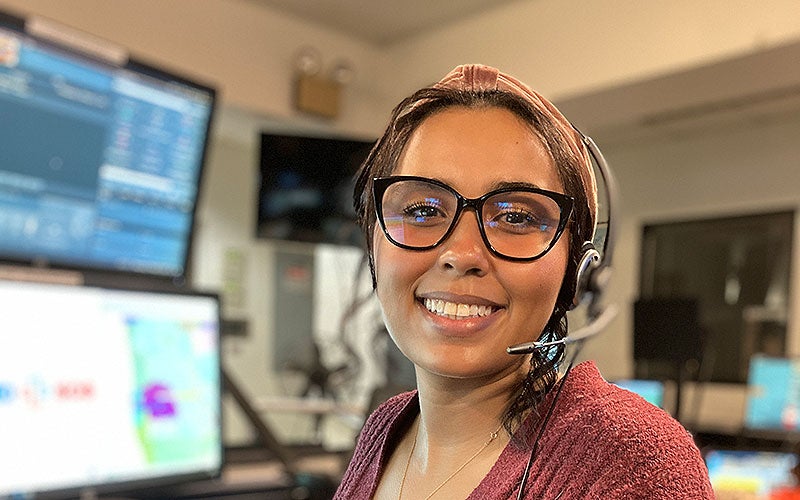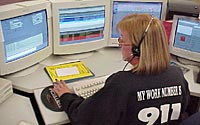9-1-1 Information

9-1-1 is the telephone number to call when you need immediate police, fire, lifeguard or medical assistance.
Download our free brochure "Help 9-1-1 Help You" in English and Español
What to Do Before Help Arrives
Before 9-1-1 help arrives at your door, there are certain things you can do to ensure a quick and effective response to your emergency.
If you have a fire or smoke in the house:
- Get out of the house immediately and do not re-enter.
If you have a medical emergency:
- If someone other than the 9-1-1 caller is available, send them outside to flag arriving emergency units to the emergency.
- If you have a 9-1-1 medical emergency and the patient is taking any prescribed medications, the care of the patient will be expedited if these are gathered and placed in a bag prior to the arrival of paramedics. Paramedics are able to gain knowledge of the patient's history and condition by looking at medications. They are also required take the patient's medications to the hospital with them for the doctor to examine.
- Before the arrival of emergency personnel, please make sure all pets are secured to assure the safety of the rescuers as well as that of the pet(s).
Before you have an emergency, the San Diego Fire-Rescue Department recommends you:
- Make sure your address is properly posted and can be seen at night as well as during the day.
- Consider painting numbers on the curb in front of your home or business to make identifying your address easier for rescue responders
What Happens When You Call 9-1-1

In the City of San Diego where your 9-1-1 call goes depends upon where you place the phone call:
Standard Phone
- If you call from a home or business phone in the City of San Diego, your 9-1-1 call first goes to the San Diego Police Department. The Police Department call taker will ask you the type of emergency (i.e. Police, Fire or Medical Emergency).
- If your emergency involves a fire or medical problem, your call will be immediately transferred to the Metro Zone Emergency Command and Data Center.
- If your emergency involves a problem in the waters of our beaches and bays, the police department call taker will forward your 9-1-1 call to the Lifeguard's Communications Center.
When you call 9-1-1 from a home or residence, your number and address may be displayed on a computer screen for the emergency call taker. This information helps City emergency crews respond more efficiently to your problem.
Cellular Phone
- If you call from a cell phone, your call is directed to the 9-1-1 dispatch center closest to your current location or, if you are near a freeway or highway, to the California Highway Patrol (CHP). Again, the call taker will ask you the nature of your emergency and will forward your call to the appropriate agency.
Be aware, when you call on your cell phone, the dispatcher may not be able to detect your location as with a residential or business 9-1-1 call. It's important to know your location when calling on a cell phone. In order for your cell phone to send your location to the dispatch center, callers need to activate their telephone GPS settings so the GPS module can pass along the caller location. Citizens should contact their service providers for detailed instructions.
What to Do When Calling 9-1-1
When you get on the phone with a City of San Diego 9-1-1 Dispatcher, it is important to remember these things to get help to your emergency as quickly as possible:
- Remain Calm.
- Be prepared to give the correct address of your emergency and the phone number from which you are calling.
- Stay on the phone with the dispatcher. Do not hang up until the dispatcher tells you to hang up. Keep in mind that help is being sent simultaneously as the dispatcher takes your information.
- If you are in a secured area, be sure to let the dispatcher know the fastest way for emergency vehicles to gain access. For instance, give the dispatcher a gate code if one is needed.
The dispatcher is going to ask you several questions about the condition of the patient requiring 9-1-1 services. It is best if the person calling 9-1-1 is near the patient to answer these questions. The dispatcher may also be giving the caller first-aid or CPR instructions as needed until the rescuers arrive.
Some of the questions the /fire/medical dispatcher may ask are:
- What is the address/location/cross street?
- What is burning, exactly?
- Do you have visible smoke or flame?
- How old is the patient?
- Is the patient conscious?
- Is the patient able to talk to you?
- What is the patient's medical history?
Call 9-1-1 for:
- Crimes in progress
- Life-threatening situations
- Fires
- Boat Fires
- Canyon Fires
- Rubbish Fire
- Structures Fires
- Traffic accidents
- Emergency medical issues (see EMS)
- Hazardous chemical spills (see Hazardous Materials)
- Fire/smoke detector or carbon monoxide alarms that are sounding
- Explosive Devices
- Elevator Rescues
- Fuel Spills (see Environmental Response Team)
- Natural Gas Leak
- Sparking electrical hazards
- Smoke in a building
- Aircraft Emergencies (Crashes, Landing Difficulties)
- Cliff Rescues
- Electrical Shorts
- Beach or water-related emergency
- Any other emergency. If in doubt, call 9-1-1.
See a display of the current incidents dispatched by San Diego Fire-Rescue.
Don't Call 9-1-1 for:
Do not call 9-1-1 if you do not have a real emergency. Non-emergency calls to 9-1-1 can delay response to true emergencies.
- Reporting a leaking fire hydrant (contact the Public Utilities Department)
- Inquiring about a large fire or other incident. Tune in local news or call 2-1-1
- Seeking information about a previous call
- Animals injured or trapped
- Snake Removal (contact the County of San Diego Animal Control Department)
- Trees down in the street (contact Street Division)
- Beehives (check the Yellow Pages for a private removal company)
- Flooding of property (fire crews will respond if the flooding is caused by the City or if the flooding is causing a hazard)
- If you are in doubt if your situation is an emergency, call 9-1-1.

